Esta capacitación está disponible en español aquí.
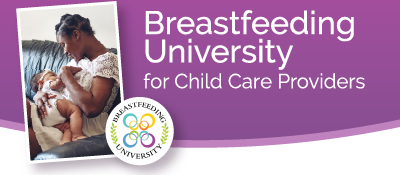
Esta capacitación está disponible en español aquí.

Making Sense of Number Sense is the second course in an eight-part series designed to support math competencies in teachers of young children. Please make sure to take the orientation course before taking this 2nd course in the series. The development of strong skills associated with this broad concept is indicative of later mathematical achievement as well as later success in school. Much of what we will cover in this module is foundational and is used in other mathematical areas. As you move through the rest of the Math at Home modules, you will see how Number Sense informs other broad mathematical concepts.
This training provides 1 contact hour of Gateways Registry-Approved training and 1 Continuing Professional Development Unit (CPDU).
Please make sure to take the following Early Math Counts Professional Development Program course before you take this course:Course 1: Introduction
Contact Hours: 1 hour Gateways Content Areas: CPD (1 hour) CDA Content Areas: PI (1 hour)
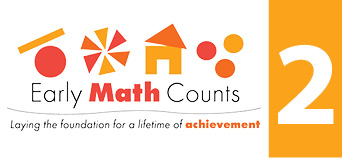
Data Collection and Analysis is the sixth course in an eight-part series designed to support math competencies in teachers of young children. As you move through this module you will see how natural and appropriate it is for young children to ask questions that can be answered via data collection. Once you see all of the possibilities relative to this broad concept, you will be amazed at how engaging and thought-provoking this is for even very young children.
This training provides 1 contact hour of Gateways Registry-Approved training and 1 Continuing Professional Development Unit (CPDU).
Please make sure to take the following Early Math Counts Professional Development Program MATH courses before you take this course:
Contact Hours: 1 hour Gateways Content Areas: CPD (1 hour) CDA Content Areas: PI (1 hour)

Module 1 - Child Development Overview: Understanding How Young Children Grow and Develop
In this module, you will receive an overview of child development for children birth through early school age. Emphasis will be on understanding basic milestones in development as well as on strategies used to promote the healthy development of children.
Contact Hours: 2 hours Gateways Content Areas: HGD (2 hours) CDA Content Areas: HS (1 hour); CD (1 hour)Esta capacitación está disponible en español aquí.
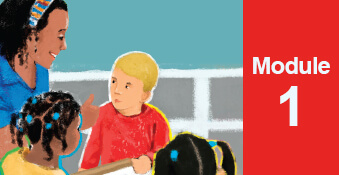
Module 2a - Health Issues for Group Care
Ensuring a child's health and well-being requires more than basic first aid and emergency contacts. In this module, you will learn how to help the growth of healthy children -- from the basics like hand washing to a more in-depth look at various practices surrounding health care.
Contact Hours: 2 hours Gateways Content Areas: HSW (2 hours) CDA Content Areas: 1 (2 hours)Esta capacitación está disponible en español aquí.
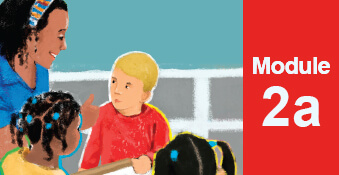
Module 2b - Nutrition Issues for Group Care
Whether you're responsible for providing a quick snack or a well-balanced meal, understanding children's dietary needs creates healthier and happier kids. Learn the basics of good nutrition, food safety and various practices surrounding nutrition through this module.
Contact Hours: 2 hours Gateways Content Areas: HSW (2 hours) CDA Content Areas: 1 (2 hours)Esta capacitación está disponible en español aquí.
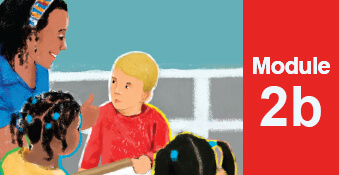
Module 2c - Safety Issues for Group Care
A child's safety is the number one concern for parents and child care providers alike. In this module, you will identify tips for creating a safer group care environment, confront the issue of abuse and neglect and learn more about emergency preparedness and first aid.
Contact Hours: 2 hours Gateways Content Areas: HSW (2 hours) CDA Content Areas: 1 (2 hours)Esta capacitación está disponible en español aquí.
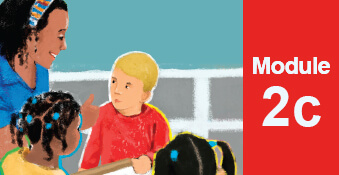
Module 3 - Observation and Guidance
It is important to know how to best help children in your care by observing them and identifying their specific needs. This module will define the different kinds of observation you can use when caring for children and how to offer more effective guidance and discipline.
Esta capacitación está disponible en español aquí.
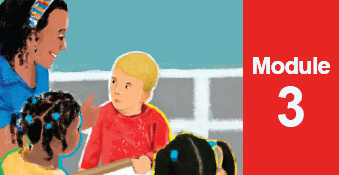
Module 4 - Learning Happens in Relationships
Our kids are constantly responding to family members, teachers, and social relationships that help to shape their understanding of the world around them. This module explores how relationships between families, children and teachers can help learning, and how crafting the environment around them can help children learn.
Contact Hours: 2 hours Gateways Content Areas: CPD (1 hour); IRE (1 hour) CDA Content Areas: 1 (1 hour); 3 (1 hour)Esta capacitación está disponible en español aquí.
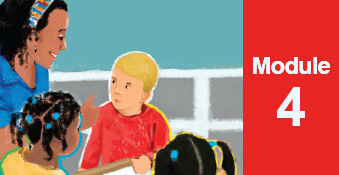
Module 5 - Family and Community Relationships
As our partners in child development, families, and especially parents, directly affect a child's learning. In this module you will learn the new ways of working with parents to help their children enjoy learning. You also will explore the social world of a family to be sure that the learning that takes place in your care is consistent with the learning done at home.
Contact Hours: 2 hours Gateways Content Areas: FCR (2 hours) CDA Content Areas: 4 (2 hours)Esta capacitación está disponible en español aquí.
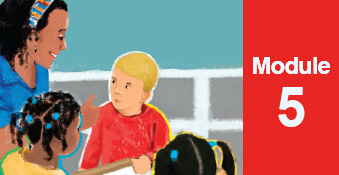
Module 6 - Personal and Professional Development
What does it mean to be a child care professional? How can you be sure you are getting the support and supplies you need? How can you set effective limits with parents and children alike? In this module, you will learn about your own professional development and how to care for yourself so you can continue to care for others.
Contact Hours: 2 hours Gateways Content Areas: PPD (2 hours) CDA Content Areas: 6 (2 hours)Esta capacitación está disponible en español aquí.
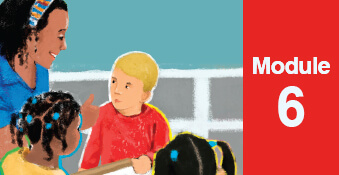
Module 7a - Child Development: Ages Birth to 8 Months
Newborns and young babies are developing at an incredible rate, causing them to have special needs unlike older children. In this module, you will understand how children from birth to 8 months learn and grow, and how to individualize their care accordingly.
Contact Hours: 2 hours Gateways Content Areas: HGD (2 hours) CDA Content Areas: 3 (1 hour); 8 (1 hour)Esta capacitación está disponible en español aquí.
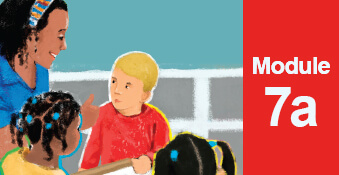
Module 7b - Child Development: Ages 8 to 18 Months
In this continuation of the first child development module, you will explore development among children ages 8-18 months. You'll identify how this age group differs in growth and their approach to learning, and you'll discover toys, games and songs that are helpful and just right for their development.
Contact Hours: 2 hours Gateways Content Areas: HGD (2 hours) CDA Content Areas: 3 (1 hour); 8 (1 hour)Esta capacitación está disponible en español aquí.
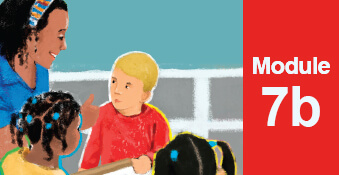
Module 7c - Child Development: Ages 18 to 36 Months
Toddlers are an energetic bunch who require plenty of stimulation and education. In this final section of child development training, you'll explore how children age 18 to 36 months learn language, learn to think, learn to move, and learn feelings, so you can better nurture this often curious age group.
Contact Hours: 2 hours Gateways Content Areas: HGD (2 hours) CDA Content Areas: 3 (1 hour); 8 (1 hour)Esta capacitación está disponible en español aquí.
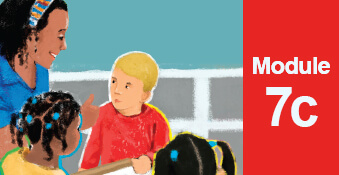
Module 8a - The Preschool-Age Child: Social and Emotional Development
As children approach preschool age, their needs begin to change. This is the first of four modules designed to better understand children as they approach school age. You will identify characteristics of social and emotional development and learn techniques for promoting appropriate and effective discipline for preschool children.
Contact Hours: 2 hours Gateways Content Areas: HGD (2 hours) CDA Content Areas: 3 (2 hours)Esta capacitación está disponible en español aquí.
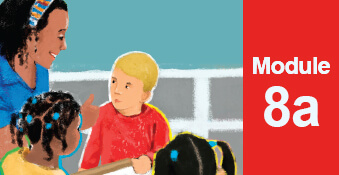
As children mature, their minds aren't the only things growing at an incredible rate. In this module, you will explore the special areas of physical development in preschool-aged children. You also will learn about fine motor activities that will help preschoolers grow into their bodies while developing proper coordination and movement.
Contact Hours: 2 hours Gateways Content Areas: HGD (1 hour); IRE (1 hour) CDA Content Areas: 2 (2 hours)Esta capacitación está disponible en español aquí.
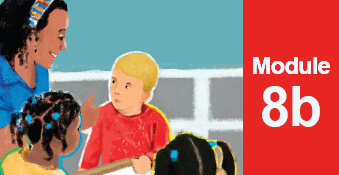
Module 8c - The Preschool-Age Child: Language Development
Appropriate speech patterns and language skills are crucial to nurturing effective communications by preschoolers. In this module, you will explore how to use pictures and storybooks to lay the foundation for good reading and proper language use.
Contact Hours: 2 hours Gateways Content Areas: HGD (2 hour) CDA Content Areas: PI (2 hours)Esta capacitación está disponible en español aquí.
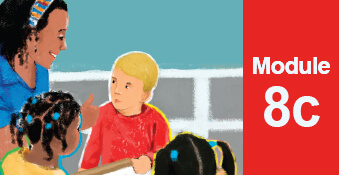
Module 8d - The Preschool-Age Child: Cognitive Development
In this module on preschool development, you will dive deeper into how preschoolers learn and identify tips for making learning fun. With suggestions for activities that encourage your preschoolers to explore numbers, shapes, colors and science, this module gives all the information you need to grow and stretch the ability of children to think and understand.
Contact Hours: 2 hours Gateways Content Areas: HGD (1 hour); CPD (1 hour) CDA Content Areas: 2 (2 hours)Esta capacitación está disponible en español aquí.
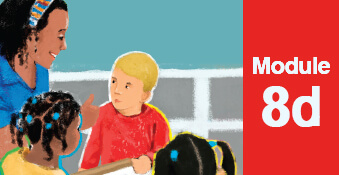
Module 9 - School-Age Development
This module on child development looks at school-age children to uncover how their learning and growth differs. With tips on how to better care for school-aged youth, this module offers you guidance on how to set rules and limits and to get your school-aged kids to appreciate safety and respect.
Contact Hours: 2 hours Gateways Content Areas: HGD (1 hour); CPD (1 hour) CDA Content Areas: 2 (1 hour); 8 (1 hour)Esta capacitación está disponible en español aquí.
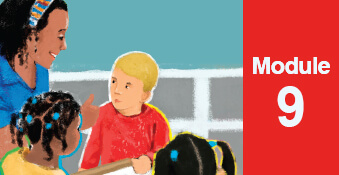
Module 1 - Child Development Overview: Understanding How Young Children Grow and Develop
In this module, you will receive an overview of child development for children birth through early school age. Emphasis will be on understanding basic milestones in development as well as on strategies used to promote the healthy development of children.
Contact Hours: 2 hours Gateways Content Areas: HGD (2 hours) CDA Content Areas: 1 (1 hour); 8 (1 hour)Module 2a - Health Issues for Group Care
Ensuring a child's health and well-being requires more than basic first aid and emergency contacts. In this module, you will learn how to help the growth of healthy children -- from the basics like hand washing to a more in-depth look at various practices surrounding health care.
Contact Hours: 2 hours Gateways Content Areas: HSW (2 hours) CDA Content Areas: 1 (2 hours)Module 2b - Nutrition Issues for Group Care
Whether you're responsible for providing a quick snack or a well-balanced meal, understanding children's dietary needs creates healthier and happier kids. Learn the basics of good nutrition, food safety and various practices surrounding nutrition through this module.
Contact Hours: 2 hours Gateways Content Areas: HSW (2 hours) CDA Content Areas: 1 (2 hours)Module 2c - Safety Issues for Group Care
A child's safety is the number one concern for parents and child care providers alike. In this module, you will identify tips for creating a safer group care environment, confront the issue of abuse and neglect and learn more about emergency preparedness and first aid.
Contact Hours: 2 hours Gateways Content Areas: HSW (2 hours) CDA Content Areas: 1 (2 hours)Module 3 - Observation and Guidance
It is important to know how to best help children in your care by observing them and identifying their specific needs. This module will define the different kinds of observation you can use when caring for children and how to offer more effective guidance and discipline.
Module 4 - Learning Happens in Relationships
Our kids are constantly responding to family members, teachers, and social relationships that help to shape their understanding of the world around them. This module explores how relationships between families, children and teachers can help learning, and how crafting the environment around them can help children learn.
Contact Hours: 2 hours Gateways Content Areas: CPD (1 hour); IRE (1 hour) CDA Content Areas: 1 (1 hour); 3 (1 hour)Module 5 - Family and Community Relationships
As our partners in child development, families, and especially parents, directly affect a child's learning. In this module you will learn the new ways of working with parents to help their children enjoy learning. You also will explore the social world of a family to be sure that the learning that takes place in your care is consistent with the learning done at home.
Contact Hours: 2 hours Gateways Content Areas: FCR (2 hours) CDA Content Areas: 4 (2 hours)Module 6 - Personal and Professional Development
What does it mean to be a child care professional? How can you be sure you are getting the support and supplies you need? How can you set effective limits with parents and children alike? In this module, you will learn about your own professional development and how to care for yourself so you can continue to care for others.
Contact Hours: 2 hours Gateways Content Areas: PPD (2 hours) CDA Content Areas: 6 (2 hours)Module 7a - Child Development: Ages Birth to 8 Months
Newborns and young babies are developing at an incredible rate, causing them to have special needs unlike older children. In this module, you will understand how children from birth to 8 months learn and grow, and how to individualize their care accordingly.
Contact Hours: 2 hours Gateways Content Areas: HGD (2 hours) CDA Content Areas: 3 (1 hour); 8 (1 hour)Module 7b - Child Development: Ages 8 to 18 Months
In this continuation of the first child development module, you will explore development among children ages 8-18 months. You'll identify how this age group differs in growth and their approach to learning, and you'll discover toys, games and songs that are helpful and just right for their development.
Contact Hours: 2 hours Gateways Content Areas: HGD (2 hours) CDA Content Areas: 3 (1 hour); 8 (1 hour)Module 7c - Child Development: Ages 18 to 36 Months
Toddlers are an energetic bunch who require plenty of stimulation and education. In this final section of child development training, you'll explore how children age 18 to 36 months learn language, learn to think, learn to move, and learn feelings, so you can better nurture this often curious age group.
Contact Hours: 2 hours Gateways Content Areas: HGD (2 hours) CDA Content Areas: 3 (1 hour); 8 (1 hour)As children mature, their minds aren't the only things growing at an incredible rate. In this module, you will explore the special areas of physical development in preschool-aged children. You also will learn about fine motor activities that will help preschoolers grow into their bodies while developing proper coordination and movement.
Contact Hours: 2 hours Gateways Content Areas: HGD (1 hour); IRE (1 hour) CDA Content Areas: 2 (2 hours)Module 8c - The Preschool-Age Child: Language Development
Appropriate speech patterns and language skills are crucial to nurturing effective communications by preschoolers. In this module, you will explore how to use pictures and storybooks to lay the foundation for good reading and proper language use.
Contact Hours: 2 hours Gateways Content Areas: HGD (1 hour); IRE (1 hour) CDA Content Areas: 2 (2 hours)Module 8d - The Preschool-Age Child: Cognitive Development
In this module on preschool development, you will dive deeper into how preschoolers learn and identify tips for making learning fun. With suggestions for activities that encourage your preschoolers to explore numbers, shapes, colors and science, this module gives all the information you need to grow and stretch the ability of children to think and understand.
Contact Hours: 2 hours Gateways Content Areas: HGD (1 hour); CPD (1 hour) CDA Content Areas: 2 (2 hours)Module 9 - School-Age Development
This module on child development looks at school-age children to uncover how their learning and growth differs. With tips on how to better care for school-aged youth, this module offers you guidance on how to set rules and limits and to get your school-aged kids to appreciate safety and respect.
Contact Hours: 2 hours Gateways Content Areas: HGD (1 hour); CPD (1 hour) CDA Content Areas: 2 (1 hour); 8 (1 hour)Module 8a - The Preschool-Age Child: Social and Emotional Development
As children approach preschool age, their needs begin to change. This is the first of four modules designed to better understand children as they approach school age. You will identify characteristics of social and emotional development and learn techniques for promoting appropriate and effective discipline for preschool children.
Contact Hours: 2 hours Gateways Content Areas: HGD (2 hours) CDA Content Areas: 3 (2 hours)Midwest Pesticide Action Center, in collaboration with the Illinois Network of Child Care Resource and Referral Agencies, has developed an online learning module to provide all Illinois child care providers with an overview of pest control strategies and requirements. In this presentation, you will become familiar with what the laws are for pest control in child care programs, be provided with a general overview of what Integrated Pest Management (IPM) is, and receive a list of the basic steps for putting an IPM program in place. Ultimately, the goal of this presentation is to provide you with the tools you need to reduce the exposure of you and the children you care for to pests and pesticides.
Contact Hours: 1 hour Gateways Content Areas: HSW (1 hour) CDA Content Areas: 1 (1 hour)
Introduction to the Child and Adult Care Food Program (CACFP) is a training made specifically for family and group home day care providers. The CACFP is an important program that helps ensure children are eating nutritious foods and developing habits to support lifelong nutrition. This training consists of three modules. Module 1 will go over the basics of the program: the “who, what, when, where, why and how.” Module 2 will cover how to get involved in the program and what you can expect when you start participating. Module 3 is all about how to get the maximum benefits out of participating. Participants will have access to helpful resources and links to support their participation in the food program.
This training was developed by the Illinois Public Health Institute with support from the Centers for Disease Control & Prevention and Illinois Department of Public Health.

A Systems Framework: Understanding the Process of I/ECMH Consultation
This module addresses the systems that I/ECMHC interfaces with. Participants will learn about system’s perspectives generally and begin to understand the settings that I/ECMH consultants work within, both formal and informal. The module explores how learning and change take place and supports consultants toward understanding their role and their relationships as change agents toward better child and family outcomes within a systems context.
Contact Hours: 2 Hours Gateways Content Area: PPD (2hours) CDA Hours: 6(2 hours)

Attachment Theory: Recognizing
Patterns and Behaviors
This module will introduce the learner to attachment theory and its history. Attachment patterns and how they are assessed will be reviewed. The learner will have the opportunity to observe children with both secure and insecure patterns of attachment through video recordings. Characteristics of infants and young children with each of the four primary attachment patterns will be described as well as characteristics of caregivers of children in the four primary attachment categories.
Contact Hours: 3 Hours Gateways Content Area: Personal and Professional Development (2 hours) and Observation and Assessment (1 hour) CDA Hours: 6- Professionalism (2 hours) and 7-Observing/Recording Behavior (1 hour)

Diversity, Equity, Inclusion, and Belonging Considerations
This module is an extension of the Diversity, Equity, and Inclusion module of the Infant/Early Childhood Mental Health Consultant orientation and to further explore Competency 3 of the IL Model of I/ECMHC, an Ability to Work Effectively Throughout Diverse Cultures and Communities. This module will investigate what diversity, equity, inclusion, and belonging (DEIB) mean for the I/ECMHC and how to put these considerations into practice. This module places a heavy emphasis on self-reflection and journaling.
Contact Hours: 3 Hours Gateways Content Area: PPD (3 hours) CDA Hours: 6(3 hours)

Exploring the Types of I/ECMH Consultation
This module will introduce the learner to the key types of infant/early childhood mental health consultation services and the various settings and contexts to which they apply. The learner will gain strategies for discerning the level and type of service appropriate for specific referrals for I/ECMHC in different settings to be most effective. The learner will have the opportunity to look at consultation through a varying lens of services by observing a child/classroom setting through video recording.
Contact Hours: 2 Hours Gateways Content Area: PPD (2hours) CDA Hours: 6(2 hours)

The Role of the Infant and Early Childhood Mental Health Professional
This module will discuss the services
offered by infant and early childhood mental health informed professionals as
well as the skills and strategies used by infant and early childhood mental
health professionals in working with infants, young children, and
families.
Contact Hours: 2 Hours Gateways Content Area: PPD (2hours) CDA Hours: 6(2 hours)

What is Infant/Early Childhood Mental Health Consultation?
This training will define Infant/Early Childhood Mental Health Consultation (/IECMHC), and explore various aspects of the history, components, and effects. This module will explain how I/ECMHC operates through a systems perspective, providing a range of services and strategies to create, strengthen, and maintain a supportive environment that enhances the social and emotional development of all infants and young children. I/ECMHC works within and across all child-serving settings (e.g., early care and education, home visiting, child welfare, child care, and at times primary care settings.)
Contact Hours: 2 Hours Gateways Content Area: PPD (2hours) CDA Hours: 6(2 hours)

This is the assessment portion of the PITC Module 1: Social-Emotional Growth & Socialization course. Participants will receive credit for the PITC Module 1 training upon completion of this portion of the course.
Contact Hours: 2
Gateways Content Area & Credential Competency: ITC - HGD 1, HGD 3, HGD 6
Esta
es la parte de evaluación del curso Módulo PITC 1: Crecimiento socioemocional y
socialización. Los participantes recibirán crédito por la capacitación del
Módulo 1 del PITC al finalizar esta parte del curso.
Horas de contacto: 2
Áreas de contenido de Gateways y Competencia de credenciales: ITC - HGD1, HGD3, HGD 6
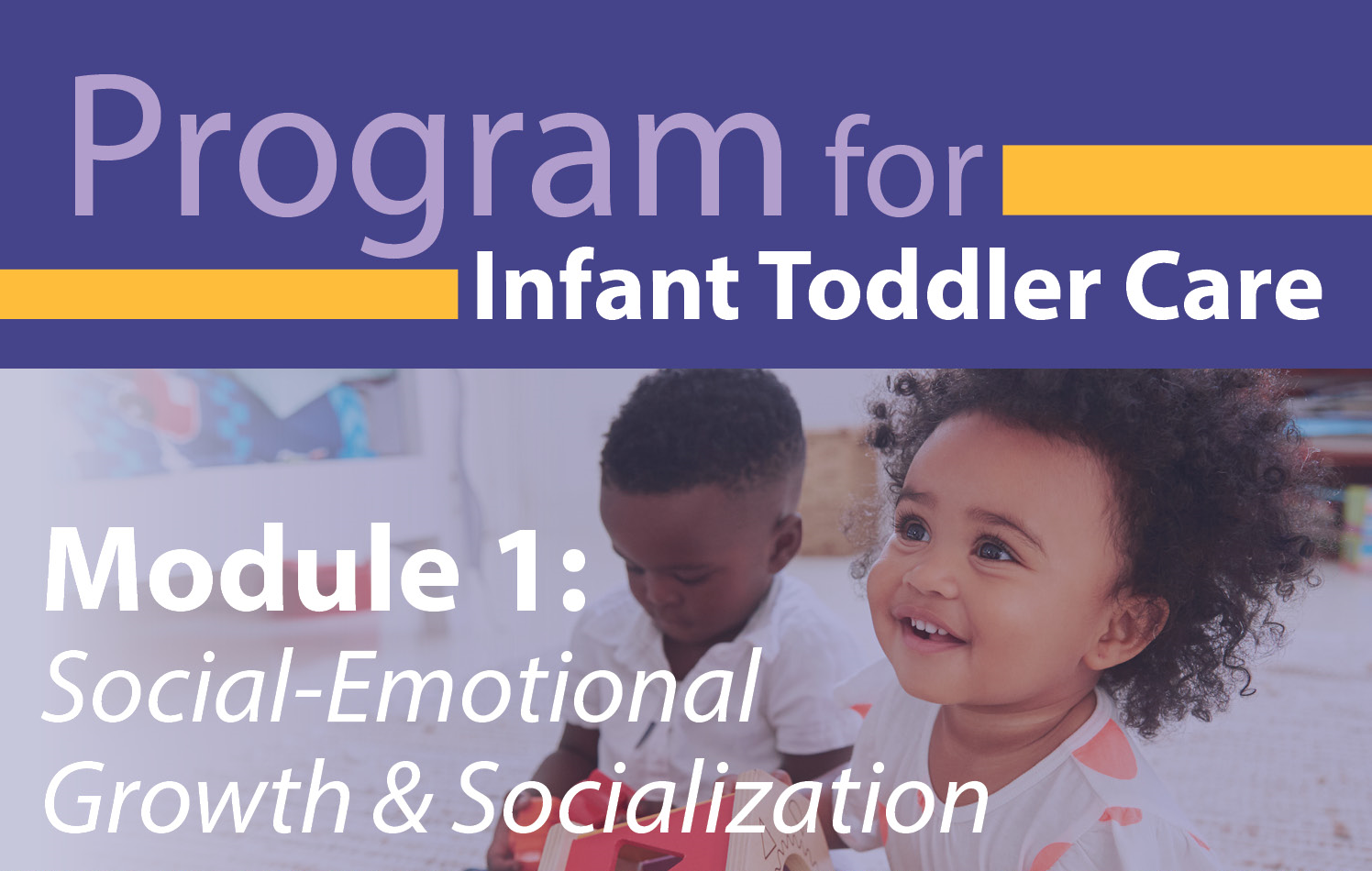
This is the assessment portion of the PITC Module 1: Social-Emotional Growth & Socialization course. Participants will receive credit for the PITC Module 1 training upon completion of this portion of the course.
Contact Hours: 2
Gateways Content Area & Credential Competency: ITC - HGD 1, HGD 3, HGD 6
Esta
es la parte de evaluación del curso Módulo PITC 1: Crecimiento socioemocional y
socialización. Los participantes recibirán crédito por la capacitación del
Módulo 1 del PITC al finalizar esta parte del curso.
Horas de contacto: 2
Áreas de contenido de Gateways y Competencia de credenciales: ITC - HGD1, HGD3, HGD 6

This is the assessment portion of the PITC Module 2: Group Care course. Participants will receive credit for the PITC Module 2 training upon completion of this portion of the course.
Contact Hours: 2
Gateways Content Area & Credential Competency: ITC - HSW2, IRE2, IRE3
Esta es la parte de evaluación del curso Módulo PITC 2: Cuidado en grupo. Los participantes recibirán crédito por la capacitación del Módulo 2 del PITC al finalizar esta parte del curso.
Horas de contacto: 2
Áreas de contenido de Gateways y Competencia de credenciales: ITC - HSW2, IRE2, IRE3
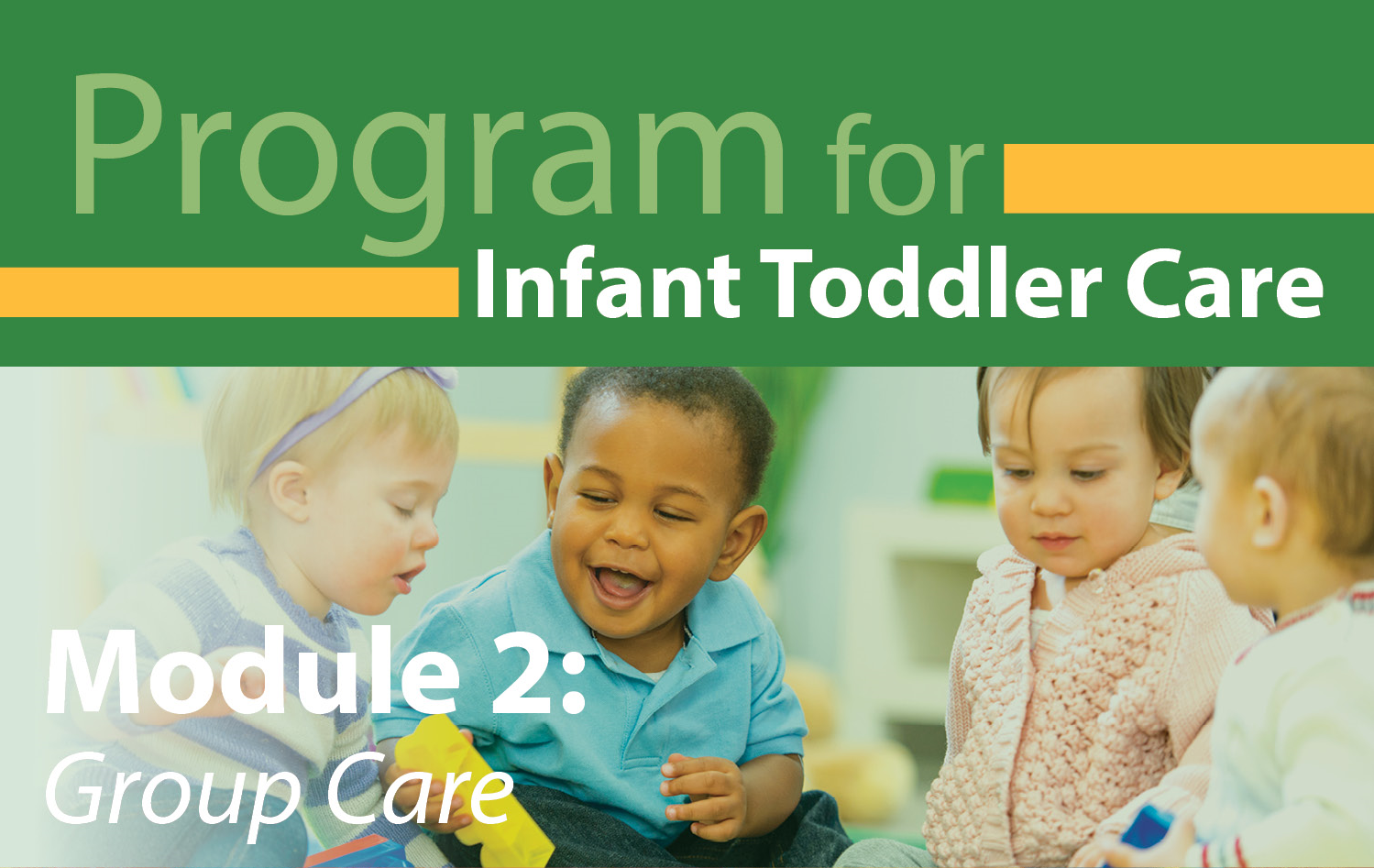
This is the assessment portion of the PITC Module 2: Group Care course. Participants will receive credit for the PITC Module 2 training upon completion of this portion of the course.
Contact Hours: 2
Gateways Content Area & Credential Competency: ITC - HSW2, IRE2, IRE3
Esta es la parte de evaluación del curso Módulo PITC 2: Cuidado en grupo. Los participantes recibirán crédito por la capacitación del Módulo 2 del PITC al finalizar esta parte del curso.
Horas de contacto: 2
Áreas de contenido de Gateways y Competencia de credenciales: ITC - HSW2, IRE2, IRE3

This is the assessment portion of the PITC Module 2: Group Care course. Participants will receive credit for the PITC Module 2 training upon completion of this portion of the course.
Contact Hours: 2
Gateways Content Area & Credential Competency: ITC - HSW2, IRE2, IRE3
Esta es la parte de evaluación del curso Módulo PITC 2: Cuidado en grupo. Los participantes recibirán crédito por la capacitación del Módulo 2 del PITC al finalizar esta parte del curso.
Horas de contacto: 2
Áreas de contenido de Gateways y Competencia de credenciales: ITC - HSW2, IRE2, IRE3

This is the assessment portion of the PITC Module 2: Group Care course. Participants will receive credit for the PITC Module 2 training upon completion of this portion of the course.
Contact Hours: 2
Gateways Content Area & Credential Competency: ITC - HSW2, IRE2, IRE3
Esta es la parte de evaluación del curso Módulo PITC 2: Cuidado en grupo. Los participantes recibirán crédito por la capacitación del Módulo 2 del PITC al finalizar esta parte del curso.
Horas de contacto: 2
Áreas de contenido de Gateways y Competencia de credenciales: ITC - HSW2, IRE2, IRE3

This is the assessment portion of the PITC Module 2: Group Care course. Participants will receive credit for the PITC Module 2 training upon completion of this portion of the course.
Contact Hours: 2
Gateways Content Area & Credential Competency: ITC - HSW2, IRE2, IRE3
Esta es la parte de evaluación del curso Módulo PITC 2: Cuidado en grupo. Los participantes recibirán crédito por la capacitación del Módulo 2 del PITC al finalizar esta parte del curso.
Horas de contacto: 2
Áreas de contenido de Gateways y Competencia de credenciales: ITC - HSW2, IRE2, IRE3

This is the assessment portion of the PITC Module 3: Learning and Development course. Participants will receive credit for the PITC Module 3 training upon completion of this portion of the course.
Contact Hours: 1
Gateways Content Area & Credential Competency: ITC - HGD1, HGD2, CPD2
Esta es la parte de evaluación del curso Módulo PITC 3: Aprendizaje y desarrollo. Los participantes recibirán crédito por la capacitación del Módulo 3 del PITC al finalizar esta parte del curso.
Horas de contacto: 1
Áreas de contenido de Gateways y Competencia de credenciales: ITC - HGD1, HGD2, CPD2
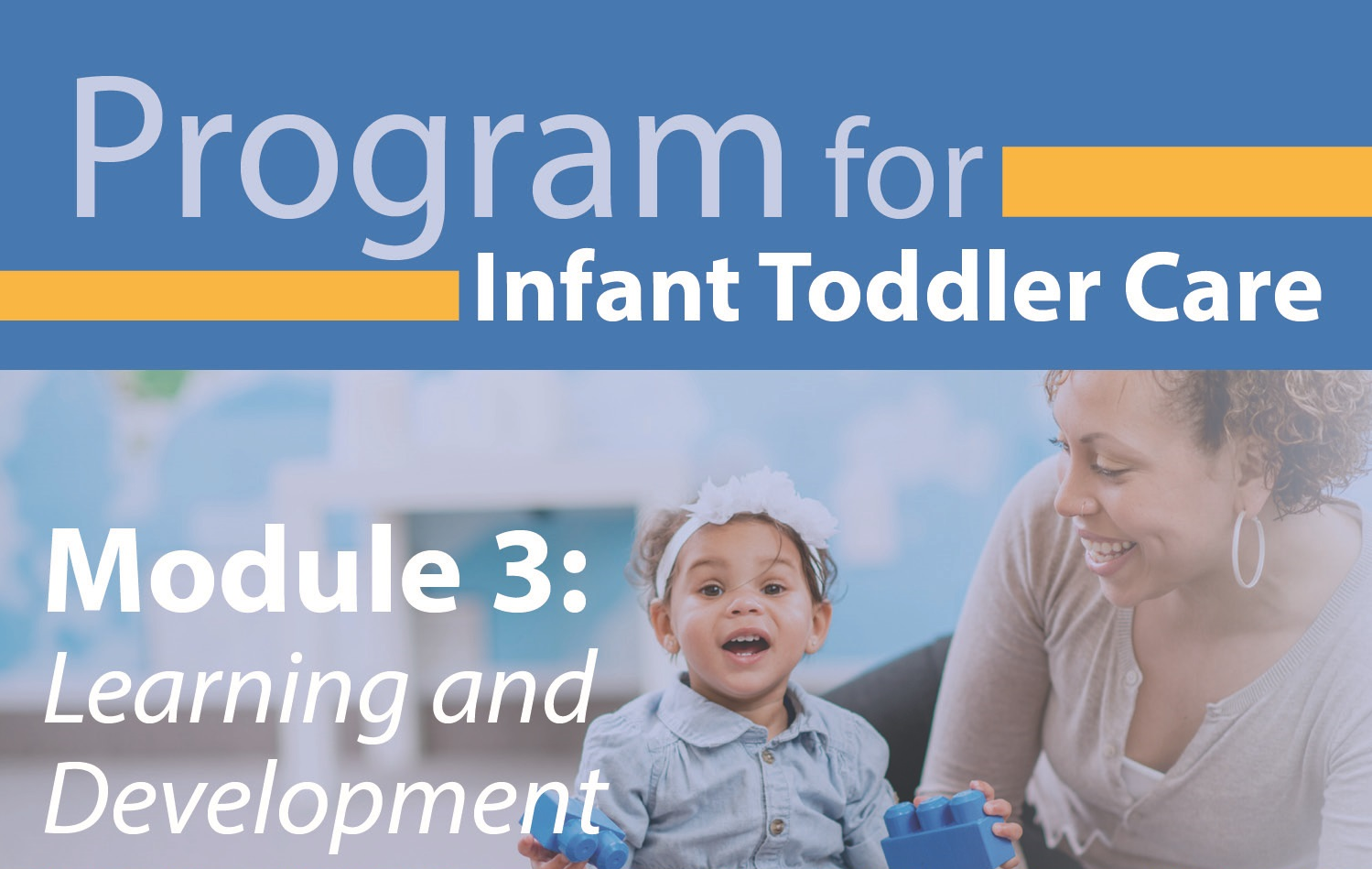
This is the assessment portion of the PITC Module 3: Learning and Development course. Participants will receive credit for the PITC Module 3 training upon completion of this portion of the course.
Contact Hours: 1
Gateways Content Area & Credential Competency: ITC - HGD1, HGD2, CPD2
Esta es la parte de evaluación del curso Módulo PITC 3: Aprendizaje y desarrollo. Los participantes recibirán crédito por la capacitación del Módulo 3 del PITC al finalizar esta parte del curso.
Horas de contacto: 1
Áreas de contenido de Gateways y Competencia de credenciales: ITC - HGD1, HGD2, CPD2

This is the assessment portion of the PITC Module 3: Learning and Development course. Participants will receive credit for the PITC Module 3 training upon completion of this portion of the course.
Contact Hours: 1
Gateways Content Area & Credential Competency: ITC - HGD1, HGD2, CPD2
Esta es la parte de evaluación del curso Módulo PITC 3: Aprendizaje y desarrollo. Los participantes recibirán crédito por la capacitación del Módulo 3 del PITC al finalizar esta parte del curso.
Horas de contacto: 1
Áreas de contenido de Gateways y Competencia de credenciales: ITC - HGD1, HGD2, CPD2

This is the assessment portion of the PITC Module 4: Culture, Family, and Providers course. Participants will receive credit for the PITC Module 4 training upon completion of this portion of the course.
Contact Hours: 1
Gateways Content Area & Credential Competency: ITC - FCR1, IRE4
Esta es la parte de evaluación del curso Módulo PITC 4: Cultura, familia y proveedores. Los participantes recibirán crédito por la capacitación del Módulo 4 del PITC al finalizar esta parte del curso.
Horas de contacto: 1
Áreas de contenido de Gateways y Competencia de credenciales: ITC – FCR1, IRE4
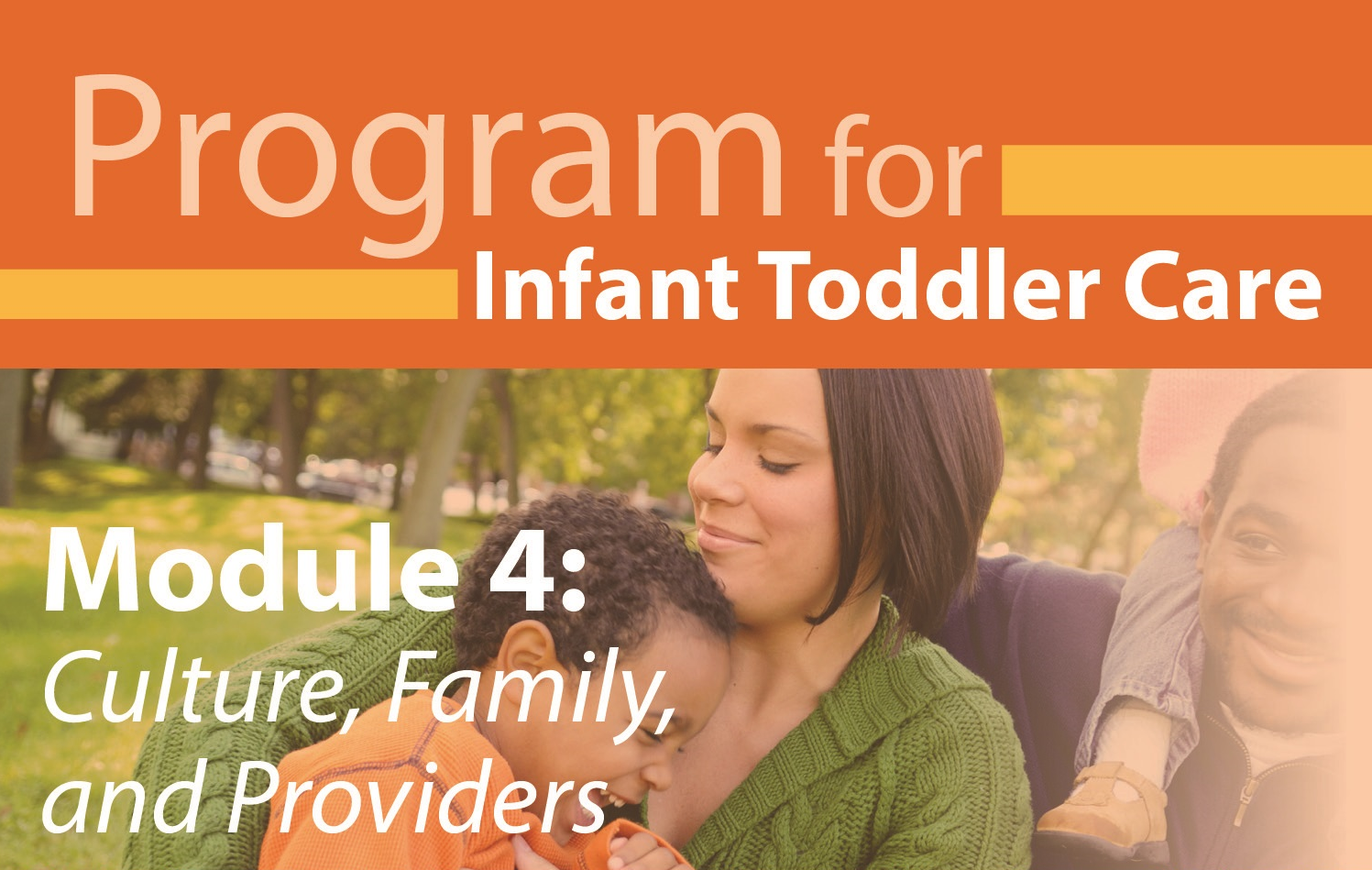
This is the assessment portion of the PITC Module 4: Culture, Family, and Providers course. Participants will receive credit for the PITC Module 4 training upon completion of this portion of the course.
Contact Hours: 1
Gateways Content Area & Credential Competency: ITC - FCR1, IRE4
Esta es la parte de evaluación del curso Módulo PITC 4: Cultura, familia y proveedores. Los participantes recibirán crédito por la capacitación del Módulo 4 del PITC al finalizar esta parte del curso.
Horas de contacto: 1
Áreas de contenido de Gateways y Competencia de credenciales: ITC – FCR1, IRE4

This is the assessment portion of the PITC Module 4: Culture, Family, and Providers course. Participants will receive credit for the PITC Module 4 training upon completion of this portion of the course.
Contact Hours: 1
Gateways Content Area & Credential Competency: ITC - FCR1, IRE4
Esta es la parte de evaluación del curso Módulo PITC 4: Cultura, familia y proveedores. Los participantes recibirán crédito por la capacitación del Módulo 4 del PITC al finalizar esta parte del curso.
Horas de contacto: 1
Áreas de contenido de Gateways y Competencia de credenciales: ITC – FCR1, IRE4

Participants will receive a brief introduction to child and youth development from ages 5–21. They will be introduced to the stages of development, along with the physical, cognitive, language, and social/emotional characteristics of development that will be used throughout the entire training series.
This course is Registry-approved and counts towards DCFS licensed program training hours (3 contact hours) for school-age and youth care.
Contact Hours: 3 hours Gateways Content Areas: HGD(2 hours), PPD(1 hour) CDA Content Areas: 6(1 hours), 8(2 hours)
Esta capacitación está disponible en español aquí.
This session will explore the general characteristics and what to look for when work with children ages 5–12. It will also discuss what to do and how to address children or youth who may have special needs. Participants will also discuss protective factors and how to offer a safety net for children and youth who may be struggling. The session will also introduce five goals that will help guide your approach when working with children and youth.
This Registry-approved training is brought to you by Gateways to Opportunity.
Contact Hours: 3 hours Gateways Content Areas: HGD(3 hours) CDA Content Areas: 8(3 hours)
Esta capacitación está disponible en español aquí.
This session will discuss developmental characteristics of early adolescents and recognize that those in this stage may appear more as a school-age child in some areas, and an adolescent in others. Other topics will include risk taking, looking into the teenage brain, moral development, and “productive engagement”.
This Registry-approved training is brought to you by Gateways to Opportunity.
Contact Hours: 3 hours Gateways Content Areas: HGD(3 hours) CDA Content Areas: 8(3 hours)
Esta capacitación está disponible en español aquí.
This session will focus on supporting the needs of the late adolescents as they transition into adulthood. Topics will include peer leadership, life skill development, supporting their growing independence, and developmentally appropriate practices for young adults ages 15–21.
This Registry-approved training is brought to you by Gateways to Opportunity.
Contact Hours: 3 hours Gateways Content Areas: HGD(3 hours) CDA Content Areas: 8(3 hours)
Esta capacitación está disponible en español aquí.
The goal of this session is to
raise awareness and discuss this important stage of development, offer
information, and point to resources for participants to use. One area
that will be highlighted is discipline, as the concepts and approach can
prove useful with all ages.
This Registry-approved training is brought to you by Gateways to Opportunity.
Contact Hours : 2 hours Gateways Content Area: HGD (2 hours) CDA Content Area: 8 (2 hours)
Preschool children are developing quickly in all areas. This session will discuss how providers can support their development by helping them interact within their worlds on many levels: through their senses, through play, and through movement. Their experiences create a framework for learning that will carry them through later stages of development and into adulthood.
This Registry-approved training is brought to you by Gateways to Opportunity.
Contact Hours : 2 hours Gateways Content Area: HGD (2 hours) CDA Content Area: 8 (2 hours)
Participants will review current licensing guidelines, health issues, and practices that ensure the well-being of school-age children and youth. Module 4a will also explain how overall good health support child and youth development, and identify ways to support children and youth in making healthy choices.
This course is Registry-approved and counts towards DCFS licensed program training hours (3 contact hours) for school-age and youth care.
Contact Hours: 3 hours Gateways Content Areas: HGD (3 hours) CDA Content Areas: 8 (3 hours)
Esta capacitación está disponible en español aquí.
Welcome to the School-age and Youth Development Credential Level 1 Training - Module 4a: "Safety." Using the National Afterschool Association (NAA) Standards, this session is designed to look at a provider’s role and responsibilities when it comes to safety policies and procedures in working with school-age and youth.
This Registry-approved training is brought to you by Gateways to Opportunity.
Contact Hours: 3 hours Gateways Content Areas: HSW (1.5 hours), IRE (1.5 hours) CDA Content Areas: 1 (1.5 hours), 2 (1.5 hours)
Esta capacitación está disponible en español aquí.
Environment and curriculum is central in working with school-age and youth. They set the stage for everything we do. This module will look at how to make environments comfortable for different ages, and how to plan in a way that is meaningful and interesting for a variety of ages. National Afterschool Association (NAA) Standards on environment and curriculum will be discussed.
This Registry-approved training is brought to you by Gateways to Opportunity.
Contact Hours: 2 hours Gateways Content Areas: CPD (1 hour); IRE (1 hours) CDA Content Areas: 1 (1 hour); 2 (1 hour)
Programming is directly connected to environment and curriculum when involved with school-age and youth development. Programming is the bridge to the people – the schedule, actual activities, and facilitation of those activities. This session will visit the concepts of variety, being mission-driven, and child and youth centered from the perspective of programming. National Afterschool Association (NAA) Standards related to programming will be addressed.
This Registry-approved training is brought to you by Gateways to Opportunity.
Contact Hours : 2 hours Gateways Content Areas: CPD (2 hours) CDA Content Areas: 2 (1 hour); 5 (1 hour)
This module will focus on how the personal and professional development of school-age and youth providers profoundly impacts the children, youth, families and colleges they work with. National Afterschool Association (NAA) Standards in human relationships and administration will be discussed.